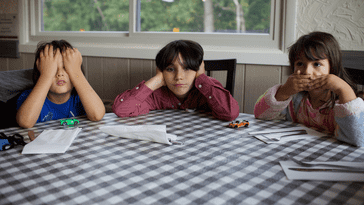
Find Help: Bullying
Bullying in any form is entirely unacceptable and must be addressed robustly by schools whenever it occurs, both inside and outside of school. Research indicates that 70% of Romani (Gypsy), Roma, and Irish Traveller children will experience race-based discrimination during their educational journey. Use the tools and services below to support your child. We are working diligently every day to tackle attitudes towards the bullying of Romani (Gypsy), Roma, and Irish Traveller children at both national and local levels.
Introduction
Experiencing bullying can be extremely challenging for any child or young person. As a parent or carer, you may feel helpless watching your child face difficulties they aren’t equipped to handle.
Engaging in open conversations about bullying is essential, even if it’s difficult. Many parents worry about causing embarrassment or damaging their child’s relationships, but your support is often their best chance of seeking help.
Bullying can lead to stress, anxiety, and depression, increasing the risk of self-harm and suicide. Your thoughtful intervention, alongside available services, can be crucial in helping your child tackle bullying. By taking action, you are safeguarding their wellbeing, health, and future.
What sub-section are available on this page?
-
-
- Advice on Supporting a Child who is Being Bullied
- Support Services for Bullying
- How to Raise Concerns Over Mishandling of Bullying
- Support We Offer
-
Advice on Supporting a Child who is Being Bullied
Talk openly with your child or young person about bullying and cyberbullying
Take the time to discuss bullying with your child, helping them recognise persistent mistreatment and label it as bullying. Children who experience bullying often feel scared, embarrassed, or confused about their emotions, especially boys who may feel pressured to suppress their feelings. It’s crucial to reassure them that no one deserves to be bullied.
Help them understand where they can ask for help
If your child doesn’t want to talk to you, encourage them to speak with another trusted adult, like a teacher or family member. They can also contact Childline, where trained counsellors provide a listening ear without requiring personal details.
Give them space and the tools to relax away from the stress of being bullied
Bullying can diminish a child’s confidence. Encourage them to engage in activities that make them feel good, such as music or sports, and reassure them that they are loved and valued.
Report bullying to the school or place of learning
Reporting bullying to the school is vital in addressing the issue. Many families fear repercussions, but schools have a duty to protect students. Ask yourself if your child will be safe and happy without reporting the bullying.
Report online bullying (such as on social media or gaming platforms)
If bullying occurs online, encourage your child to block anyone posting hateful content and report abusive comments to the respective platform. Don’t restrict their internet use, as this may feel punitive and deter them from sharing their experiences with you. Resources like Net Aware and Thinkuknow offer guidance on online safety.
Report hate crime
Bullying based on gender, identity, sexuality, religion, race, or disability constitutes a hate crime and is illegal. Report such incidents online or contact the police at 101, or call 999 in emergencies. Citizens Advice provides further information on hate crime and discrimination.
Check in with your child
Regularly check in with your child, reminding them that they can talk to you about their feelings anytime.
Access health support services for your child or young person
For additional support, consult your GP or school about available health services in the community.
Support Services for Bullying
Young Minds
We are leading the movement to make sure every young person gets the mental health support they need, when they need it, no matter what.
It takes courage to ask for help. But for many young people who do, the support they need just isn’t there.
In the UK today, an estimated five children in every classroom has a mental health problem. A quarter of 17-year-old girls have self-harmed in the last year while suicide remains the single biggest killer of boys and young men. But things can get better.
We provide young people with tools to look after their mental health. We empower adults to be the best support they can be to the young people in their lives. And we give young people the space and confidence to get their voices heard and change the world we live in.
Together, we can create a world where no young person feels alone with their mental health.
Access the Young Minds website here.

Young Minds - Textline
There’s no problem ‘too big’ or ‘too small’ – if you can’t cope, don’t bottle it up. Whether you’ve had a really stressful day, or you’ve been going through something difficult for a while and don’t know where to turn, text YM to 85258 any time. We’re here for you.
YoungMinds Textline service can help if you’re going through something difficult or distressing, including:
- anxiety
• loneliness
• panic attacks
• abuse or assault
• depression or low mood
• self-harm
• bullying
• suicidal thoughts
• relationship issues

Childline
Childline is here to help anyone under 19 in the UK with any issue they’re going through.
You can talk about anything. Whether it’s something big or small, our trained counsellors are here to support you.
Childline is free, confidential and available any time, day or night. You can talk to us:
- by calling 0800 1111
- by email
- through 1-2-1 counsellor chat
Whatever feels best for you.
Access the Childline website here.

NSPCC
Worried about a child?
If you’re worried about a child, even if you’re unsure, contact our helpline to speak to one of our counsellors. Call us on 0808 800 5000, email help@nspcc.org.uk or fill in our online form.
Access the NSPCC website here.

How to Raise Concerns Over Mishandling of Bullying
This section is supported by the information provided by the Anti-Bullying Alliance.
Most schools are willing and able to manage concerns about bullying. However, there are times when children and their parents or carers feel unheard and may need to take further action. This may be especially true for Romany Gypsy, Roma, and Irish Traveller families who believe that their concerns regarding racist bullying are not being addressed. In such cases, it’s essential to file a complaint to challenge the school’s actions. While some parents fear retaliation, it’s important to know that such behaviour may be unlawful. Support is available to help you address any retaliatory actions, and it’s crucial not to let instances of mishandled bullying go unchallenged.
For more information on making a complaint about a school if a bullying issue is not resolved, including relevant forms and contact details for Ofsted, the Education Funding Agency and the Department for Education visit https://contact.ofsted.gov.uk/online-complaints.
Follow the school complaints procedure
Whether your child attends a school, academy, or college—public or private—your first step should be to follow the school’s internal complaints procedure, which they are required to have under the Education Act 2002. A typical process includes:
- Discussing your concerns with your child’s tutor or Head of Year.
- Sending a letter to the Headteacher if initial discussions do not resolve the issue.
- If necessary, escalating the matter by writing to the Chair of Governors.
Always keep your letters concise and factual, and retain copies of all correspondence. If your child continues to experience bullying, it may help to maintain a diary of events, which can be shared with the school.
Further action you can take
- Contact the Local Authority: Your local authority may have staff who can provide support for you and your child. Bullying is a child protection issue, and your concerns should be taken seriously.
- Contact the Secretary of State for Education: If your child is in a maintained school and you’ve exhausted the school complaints procedure, you can write to the Secretary of State for Education. Include all steps you’ve taken to resolve the complaint. Address your letter to:
The Secretary of State
Department for Education
Sanctuary Buildings
Great Smith Street
London, SW1P 3BT
For further details, visit Department for Education.
- Contact Ofsted: Ofsted has the authority to consider certain complaints about schools under Section 11 of the Education Act 2005, provided you have followed the school’s complaints procedure. For more information, visit Ofsted’s Website.
- Contact Your Local MP: Your local MP can listen to your concerns about bullying in school or the community and may raise these issues with the local authority or the Department for Education on your behalf.
Support We Offer
If you are concerned that your conversations with your child’s school aren’t being taken seriously, give our Community Advocacy Caseworker a call on 07908 433413. We are always here to support you.


